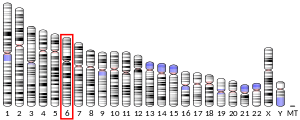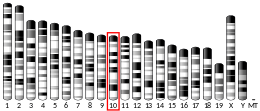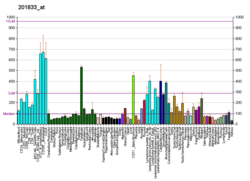Histone deacetylase 2
Histone deacetylase 2 (HDAC2) is an enzyme that in humans is encoded by the HDAC2 gene.[5]
Function
This gene product belongs to the histone deacetylase family. Histone deacetylases act via the formation of large multiprotein complexes and are responsible for the deacetylation of lysine residues on the N-terminal region of the core histones (H2A, H2B, H3 and H4). This protein also forms transcriptional repressor complexes by associating with many different proteins, including YY1, a mammalian zinc-finger transcription factor. Thus it plays an important role in transcriptional regulation, cell cycle progression and developmental events.[6]
Interactions
Histone deacetylase 2 has been shown to interact with:
- Ataxia telangiectasia and Rad3 related,[7]
- BUB3,[8]
- CDC20,[8]
- CDH1,[8]
- CHD3,[9][10][11]
- CHD4,[7][9][10]
- DNMT1,[12]
- EED,[13]
- EZH2[13] and
- FKBP3,[14]
- GATA4,[15]
- GTF2I,[9][16]
- HDAC10,[17]
- HDAC1,[9][10][13][17][18][19][20][21][22][23][24][25][26]
- HMG20B,[9][19]
- HSPA4,[20]
- Host cell factor C1,[27]
- MTA1,[9][18][28]
- MTA2,[9][18][24]
- MXD1,[29][30]
- Mad1,[8]
- Methyl-CpG-binding domain protein 2,[24][31][32]
- PHF21A,[9][19][33]
- PPP1R8,[34]
- RBBP4,[9][10][35][36]
- RCOR1,[19][37]
- RELA,[38][39]
- Retinoblastoma protein,[40]
- SAP30,[24][41][42]
- SIN3A,[9][10][29][35][36][43][44]
- SMARCA5,[11]
- SNW1,[45]
- SUV39H1,[46]
- Sp1 transcription factor,[36][47][48]
- Sp3 transcription factor,[47][48]
- TOP2B,[49] and
- YY1.[50][51][52]
See also
References
- 1 2 3 GRCh38: Ensembl release 89: ENSG00000196591 - Ensembl, May 2017
- 1 2 3 GRCm38: Ensembl release 89: ENSMUSG00000019777 - Ensembl, May 2017
- ↑ "Human PubMed Reference:".
- ↑ "Mouse PubMed Reference:".
- ↑ Betz R, Gray SG, Ekström C, Larsson C, Ekström TJ (December 1998). "Human histone deacetylase 2, HDAC2 (Human RPD3), is localized to 6q21 by radiation hybrid mapping". Genomics. 52 (2): 245–6. doi:10.1006/geno.1998.5435. PMID 9782097.
- ↑ "Entrez Gene: HDAC2 histone deacetylase 2".
- 1 2 Schmidt DR, Schreiber SL (November 1999). "Molecular association between ATR and two components of the nucleosome remodeling and deacetylating complex, HDAC2 and CHD4". Biochemistry. 38 (44): 14711–7. doi:10.1021/bi991614n. PMID 10545197.
- 1 2 3 4 Yoon YM, Baek KH, Jeong SJ, Shin HJ, Ha GH, Jeon AH, Hwang SG, Chun JS, Lee CW (September 2004). "WD repeat-containing mitotic checkpoint proteins act as transcriptional repressors during interphase". FEBS Lett. 575 (1–3): 23–9. doi:10.1016/j.febslet.2004.07.089. PMID 15388328.
- 1 2 3 4 5 6 7 8 9 10 Hakimi MA, Dong Y, Lane WS, Speicher DW, Shiekhattar R (February 2003). "A candidate X-linked mental retardation gene is a component of a new family of histone deacetylase-containing complexes". J. Biol. Chem. 278 (9): 7234–9. doi:10.1074/jbc.M208992200. PMID 12493763.
- 1 2 3 4 5 Tong JK, Hassig CA, Schnitzler GR, Kingston RE, Schreiber SL (October 1998). "Chromatin deacetylation by an ATP-dependent nucleosome remodelling complex". Nature. 395 (6705): 917–21. doi:10.1038/27699. PMID 9804427.
- 1 2 Hakimi MA, Bochar DA, Schmiesing JA, Dong Y, Barak OG, Speicher DW, Yokomori K, Shiekhattar R (August 2002). "A chromatin remodelling complex that loads cohesin onto human chromosomes". Nature. 418 (6901): 994–8. doi:10.1038/nature01024. PMID 12198550.
- ↑ Rountree MR, Bachman KE, Baylin SB (July 2000). "DNMT1 binds HDAC2 and a new co-repressor, DMAP1, to form a complex at replication foci". Nat. Genet. 25 (3): 269–77. doi:10.1038/77023. PMID 10888872.
- 1 2 3 van der Vlag J, Otte AP (December 1999). "Transcriptional repression mediated by the human polycomb-group protein EED involves histone deacetylation". Nat. Genet. 23 (4): 474–8. doi:10.1038/70602. PMID 10581039.
- ↑ Yang WM, Yao YL, Seto E. "The FK506-binding protein 25 functionally associates with histone deacetylases and with transcription factor YY1". EMBO J. 20 (17): 4814–25. doi:10.1093/emboj/20.17.4814. PMC 125595. PMID 11532945.
- ↑ "Three-way control of fetal heart-cell proliferation could help regenerate cardiac cells". October 7, 2010.
- ↑ Wen YD, Cress WD, Roy AL, Seto E (January 2003). "Histone deacetylase 3 binds to and regulates the multifunctional transcription factor TFII-I". J. Biol. Chem. 278 (3): 1841–7. doi:10.1074/jbc.M206528200. PMID 12393887.
- 1 2 Fischer DD, Cai R, Bhatia U, Asselbergs FA, Song C, Terry R, Trogani N, Widmer R, Atadja P, Cohen D (February 2002). "Isolation and characterization of a novel class II histone deacetylase, HDAC10". J. Biol. Chem. 277 (8): 6656–66. doi:10.1074/jbc.M108055200. PMID 11739383.
- 1 2 3 Yao YL, Yang WM (October 2003). "The metastasis-associated proteins 1 and 2 form distinct protein complexes with histone deacetylase activity". J. Biol. Chem. 278 (43): 42560–8. doi:10.1074/jbc.M302955200. PMID 12920132.
- 1 2 3 4 Hakimi MA, Bochar DA, Chenoweth J, Lane WS, Mandel G, Shiekhattar R. "A core-BRAF35 complex containing histone deacetylase mediates repression of neuronal-specific genes". Proc. Natl. Acad. Sci. U.S.A. 99 (11): 7420–5. doi:10.1073/pnas.112008599. PMC 124246. PMID 12032298.
- 1 2 Johnson CA, White DA, Lavender JS, O'Neill LP, Turner BM (March 2002). "Human class I histone deacetylase complexes show enhanced catalytic activity in the presence of ATP and co-immunoprecipitate with the ATP-dependent chaperone protein Hsp70". J. Biol. Chem. 277 (11): 9590–7. doi:10.1074/jbc.M107942200. PMID 11777905.
- ↑ Fischle W, Dequiedt F, Hendzel MJ, Guenther MG, Lazar MA, Voelter W, Verdin E (January 2002). "Enzymatic activity associated with class II HDACs is dependent on a multiprotein complex containing HDAC3 and SMRT/N-CoR". Mol. Cell. 9 (1): 45–57. doi:10.1016/s1097-2765(01)00429-4. PMID 11804585.
- ↑ Fischle W, Dequiedt F, Fillion M, Hendzel MJ, Voelter W, Verdin E (September 2001). "Human HDAC7 histone deacetylase activity is associated with HDAC3 in vivo". J. Biol. Chem. 276 (38): 35826–35. doi:10.1074/jbc.M104935200. PMID 11466315.
- ↑ Ashburner BP, Westerheide SD, Baldwin AS. "The p65 (RelA) subunit of NF-kappaB interacts with the histone deacetylase (HDAC) corepressors HDAC1 and HDAC2 to negatively regulate gene expression". Mol. Cell. Biol. 21 (20): 7065–77. doi:10.1128/MCB.21.20.7065-7077.2001. PMC 99882. PMID 11564889.
- 1 2 3 4 Zhang Y, Ng HH, Erdjument-Bromage H, Tempst P, Bird A, Reinberg D. "Analysis of the NuRD subunits reveals a histone deacetylase core complex and a connection with DNA methylation". Genes Dev. 13 (15): 1924–35. doi:10.1101/gad.13.15.1924. PMC 316920. PMID 10444591.
- ↑ Hassig CA, Tong JK, Fleischer TC, Owa T, Grable PG, Ayer DE, Schreiber SL. "A role for histone deacetylase activity in HDAC1-mediated transcriptional repression". Proc. Natl. Acad. Sci. U.S.A. 95 (7): 3519–24. doi:10.1073/pnas.95.7.3519. PMC 19868. PMID 9520398.
- ↑ Zhang Y, Iratni R, Erdjument-Bromage H, Tempst P, Reinberg D (May 1997). "Histone deacetylases and SAP18, a novel polypeptide, are components of a human Sin3 complex". Cell. 89 (3): 357–64. doi:10.1016/s0092-8674(00)80216-0. PMID 9150135.
- ↑ Wysocka J, Myers MP, Laherty CD, Eisenman RN, Herr W. "Human Sin3 deacetylase and trithorax-related Set1/Ash2 histone H3-K4 methyltransferase are tethered together selectively by the cell-proliferation factor HCF-1". Genes Dev. 17 (7): 896–911. doi:10.1101/gad.252103. PMC 196026. PMID 12670868.
- ↑ Mazumdar A, Wang RA, Mishra SK, Adam L, Bagheri-Yarmand R, Mandal M, Vadlamudi RK, Kumar R (January 2001). "Transcriptional repression of oestrogen receptor by metastasis-associated protein 1 corepressor". Nat. Cell Biol. 3 (1): 30–7. doi:10.1038/35050532. PMID 11146623.
- 1 2 Laherty CD, Yang WM, Sun JM, Davie JR, Seto E, Eisenman RN (May 1997). "Histone deacetylases associated with the mSin3 corepressor mediate mad transcriptional repression". Cell. 89 (3): 349–56. doi:10.1016/s0092-8674(00)80215-9. PMID 9150134.
- ↑ Spronk CA, Tessari M, Kaan AM, Jansen JF, Vermeulen M, Stunnenberg HG, Vuister GW (December 2000). "The Mad1-Sin3B interaction involves a novel helical fold". Nat. Struct. Biol. 7 (12): 1100–4. doi:10.1038/81944. PMID 11101889.
- ↑ Brackertz M, Boeke J, Zhang R, Renkawitz R (October 2002). "Two highly related p66 proteins comprise a new family of potent transcriptional repressors interacting with MBD2 and MBD3". J. Biol. Chem. 277 (43): 40958–66. doi:10.1074/jbc.M207467200. PMID 12183469.
- ↑ Ng HH, Zhang Y, Hendrich B, Johnson CA, Turner BM, Erdjument-Bromage H, Tempst P, Reinberg D, Bird A (September 1999). "MBD2 is a transcriptional repressor belonging to the MeCP1 histone deacetylase complex". Nat. Genet. 23 (1): 58–61. doi:10.1038/12659. PMID 10471499.
- ↑ Iwase S, Januma A, Miyamoto K, Shono N, Honda A, Yanagisawa J, Baba T (September 2004). "Characterization of BHC80 in BRAF-HDAC complex, involved in neuron-specific gene repression". Biochem. Biophys. Res. Commun. 322 (2): 601–8. doi:10.1016/j.bbrc.2004.07.163. PMID 15325272.
- ↑ Jin Q, van Eynde A, Beullens M, Roy N, Thiel G, Stalmans W, Bollen M (August 2003). "The protein phosphatase-1 (PP1) regulator, nuclear inhibitor of PP1 (NIPP1), interacts with the polycomb group protein, embryonic ectoderm development (EED), and functions as a transcriptional repressor". J. Biol. Chem. 278 (33): 30677–85. doi:10.1074/jbc.M302273200. PMID 12788942.
- 1 2 Zhang Y, Dufau ML (June 2003). "Dual mechanisms of regulation of transcription of luteinizing hormone receptor gene by nuclear orphan receptors and histone deacetylase complexes". J. Steroid Biochem. Mol. Biol. 85 (2–5): 401–14. doi:10.1016/s0960-0760(03)00230-9. PMID 12943729.
- 1 2 3 Zhang Y, Dufau ML (September 2002). "Silencing of transcription of the human luteinizing hormone receptor gene by histone deacetylase-mSin3A complex". J. Biol. Chem. 277 (36): 33431–8. doi:10.1074/jbc.M204417200. PMID 12091390.
- ↑ You A, Tong JK, Grozinger CM, Schreiber SL. "CoREST is an integral component of the CoREST- human histone deacetylase complex". Proc. Natl. Acad. Sci. U.S.A. 98 (4): 1454–8. doi:10.1073/pnas.98.4.1454. PMC 29278. PMID 11171972.
- ↑ Kiernan R, Brès V, Ng RW, Coudart MP, El Messaoudi S, Sardet C, Jin DY, Emiliani S, Benkirane M (January 2003). "Post-activation turn-off of NF-kappa B-dependent transcription is regulated by acetylation of p65". J. Biol. Chem. 278 (4): 2758–66. doi:10.1074/jbc.M209572200. PMID 12419806.
- ↑ Yu Z, Zhang W, Kone BC (August 2002). "Histone deacetylases augment cytokine induction of the iNOS gene". J. Am. Soc. Nephrol. 13 (8): 2009–17. doi:10.1097/01.asn.0000024253.59665.f1. PMID 12138131.
- ↑ Lai A, Lee JM, Yang WM, DeCaprio JA, Kaelin WG, Seto E, Branton PE. "RBP1 recruits both histone deacetylase-dependent and -independent repression activities to retinoblastoma family proteins". Mol. Cell. Biol. 19 (10): 6632–41. doi:10.1128/mcb.19.10.6632. PMC 84642. PMID 10490602.
- ↑ Zhang Y, Sun ZW, Iratni R, Erdjument-Bromage H, Tempst P, Hampsey M, Reinberg D (June 1998). "SAP30, a novel protein conserved between human and yeast, is a component of a histone deacetylase complex". Mol. Cell. 1 (7): 1021–31. doi:10.1016/s1097-2765(00)80102-1. PMID 9651585.
- ↑ Kuzmichev A, Zhang Y, Erdjument-Bromage H, Tempst P, Reinberg D. "Role of the Sin3-histone deacetylase complex in growth regulation by the candidate tumor suppressor p33(ING1)". Mol. Cell. Biol. 22 (3): 835–48. doi:10.1128/mcb.22.3.835-848.2002. PMC 133546. PMID 11784859.
- ↑ Fleischer TC, Yun UJ, Ayer DE. "Identification and characterization of three new components of the mSin3A corepressor complex". Mol. Cell. Biol. 23 (10): 3456–67. doi:10.1128/mcb.23.10.3456-3467.2003. PMC 164750. PMID 12724404.
- ↑ Yang L, Mei Q, Zielinska-Kwiatkowska A, Matsui Y, Blackburn ML, Benedetti D, Krumm AA, Taborsky GJ, Chansky HA. "An ERG (ets-related gene)-associated histone methyltransferase interacts with histone deacetylases 1/2 and transcription co-repressors mSin3A/B". Biochem. J. 369 (Pt 3): 651–7. doi:10.1042/BJ20020854. PMC 1223118. PMID 12398767.
- ↑ Zhou S, Fujimuro M, Hsieh JJ, Chen L, Hayward SD. "A role for SKIP in EBNA2 activation of CBF1-repressed promoters". J. Virol. 74 (4): 1939–47. doi:10.1128/jvi.74.4.1939-1947.2000. PMC 111672. PMID 10644367.
- ↑ Vaute O, Nicolas E, Vandel L, Trouche D. "Functional and physical interaction between the histone methyl transferase Suv39H1 and histone deacetylases". Nucleic Acids Res. 30 (2): 475–81. doi:10.1093/nar/30.2.475. PMC 99834. PMID 11788710.
- 1 2 Won J, Yim J, Kim TK (October 2002). "Sp1 and Sp3 recruit histone deacetylase to repress transcription of human telomerase reverse transcriptase (hTERT) promoter in normal human somatic cells". J. Biol. Chem. 277 (41): 38230–8. doi:10.1074/jbc.M206064200. PMID 12151407.
- 1 2 Sun JM, Chen HY, Moniwa M, Litchfield DW, Seto E, Davie JR (September 2002). "The transcriptional repressor Sp3 is associated with CK2-phosphorylated histone deacetylase 2". J. Biol. Chem. 277 (39): 35783–6. doi:10.1074/jbc.C200378200. PMID 12176973.
- ↑ Tsai SC, Valkov N, Yang WM, Gump J, Sullivan D, Seto E (November 2000). "Histone deacetylase interacts directly with DNA topoisomerase II". Nat. Genet. 26 (3): 349–53. doi:10.1038/81671. PMID 11062478.
- ↑ Yang WM, Yao YL, Sun JM, Davie JR, Seto E (October 1997). "Isolation and characterization of cDNAs corresponding to an additional member of the human histone deacetylase gene family". J. Biol. Chem. 272 (44): 28001–7. doi:10.1074/jbc.272.44.28001. PMID 9346952.
- ↑ Yao YL, Yang WM, Seto E. "Regulation of transcription factor YY1 by acetylation and deacetylation". Mol. Cell. Biol. 21 (17): 5979–91. doi:10.1128/mcb.21.17.5979-5991.2001. PMC 87316. PMID 11486036.
- ↑ Kalenik JL, Chen D, Bradley ME, Chen SJ, Lee TC. "Yeast two-hybrid cloning of a novel zinc finger protein that interacts with the multifunctional transcription factor YY1". Nucleic Acids Res. 25 (4): 843–9. doi:10.1093/nar/25.4.843. PMC 146511. PMID 9016636.
Further reading
- Ahringer J (2000). "NuRD and SIN3 histone deacetylase complexes in development". Trends Genet. 16 (8): 351–6. doi:10.1016/S0168-9525(00)02066-7. PMID 10904264.
- Verdin E, Dequiedt F, Kasler HG (2003). "Class II histone deacetylases: versatile regulators". Trends Genet. 19 (5): 286–93. doi:10.1016/S0168-9525(03)00073-8. PMID 12711221.
- Zhang Y, Dufau ML (2003). "Dual mechanisms of regulation of transcription of luteinizing hormone receptor gene by nuclear orphan receptors and histone deacetylase complexes". J. Steroid Biochem. Mol. Biol. 85 (2–5): 401–14. doi:10.1016/S0960-0760(03)00230-9. PMID 12943729.
- Furukawa Y, Kawakami T, Sudo K, Inazawa J, Matsumine A, Akiyama T, Nakamura Y (1996). "Isolation and mapping of a human gene (RPD3L1) that is homologous to RPD3, a transcription factor in Saccharomyces cerevisiae". Cytogenet. Cell Genet. 73 (1–2): 130–3. doi:10.1159/000134323. PMID 8646880.
- Yang WM, Inouye C, Zeng Y, Bearss D, Seto E (1996). "Transcriptional repression by YY1 is mediated by interaction with a mammalian homolog of the yeast global regulator RPD3". Proc. Natl. Acad. Sci. U.S.A. 93 (23): 12845–50. doi:10.1073/pnas.93.23.12845. PMC 24008. PMID 8917507.
- Laherty CD, Yang WM, Sun JM, Davie JR, Seto E, Eisenman RN (1997). "Histone deacetylases associated with the mSin3 corepressor mediate mad transcriptional repression". Cell. 89 (3): 349–56. doi:10.1016/S0092-8674(00)80215-9. PMID 9150134.
- Zhang Y, Iratni R, Erdjument-Bromage H, Tempst P, Reinberg D (1997). "Histone deacetylases and SAP18, a novel polypeptide, are components of a human Sin3 complex". Cell. 89 (3): 357–64. doi:10.1016/S0092-8674(00)80216-0. PMID 9150135.
- Yang WM, Yao YL, Sun JM, Davie JR, Seto E (1997). "Isolation and characterization of cDNAs corresponding to an additional member of the human histone deacetylase gene family". J. Biol. Chem. 272 (44): 28001–7. doi:10.1074/jbc.272.44.28001. PMID 9346952.
- Hassig CA, Tong JK, Fleischer TC, Owa T, Grable PG, Ayer DE, Schreiber SL (1998). "A role for histone deacetylase activity in HDAC1-mediated transcriptional repression". Proc. Natl. Acad. Sci. U.S.A. 95 (7): 3519–24. doi:10.1073/pnas.95.7.3519. PMC 19868. PMID 9520398.
- Randhawa GS, Bell DW, Testa JR, Feinberg AP (1998). "Identification and mapping of human histone acetylation modifier gene homologues". Genomics. 51 (2): 262–9. doi:10.1006/geno.1998.5370. PMID 9722949.
- Zhang Y, LeRoy G, Seelig HP, Lane WS, Reinberg D (1998). "The dermatomyositis-specific autoantigen Mi2 is a component of a complex containing histone deacetylase and nucleosome remodeling activities". Cell. 95 (2): 279–89. doi:10.1016/S0092-8674(00)81758-4. PMID 9790534.
- Tong JK, Hassig CA, Schnitzler GR, Kingston RE, Schreiber SL (1998). "Chromatin deacetylation by an ATP-dependent nucleosome remodelling complex". Nature. 395 (6705): 917–21. doi:10.1038/27699. PMID 9804427.
- Hsieh JJ, Zhou S, Chen L, Young DB, Hayward SD (1999). "CIR, a corepressor linking the DNA binding factor CBF1 to the histone deacetylase complex". Proc. Natl. Acad. Sci. U.S.A. 96 (1): 23–8. doi:10.1073/pnas.96.1.23. PMC 15086. PMID 9874765.
- Yarden RI, Brody LC (1999). "BRCA1 interacts with components of the histone deacetylase complex". Proc. Natl. Acad. Sci. U.S.A. 96 (9): 4983–8. doi:10.1073/pnas.96.9.4983. PMC 21803. PMID 10220405.
- Koipally J, Renold A, Kim J, Georgopoulos K (1999). "Repression by Ikaros and Aiolos is mediated through histone deacetylase complexes". EMBO J. 18 (11): 3090–100. doi:10.1093/emboj/18.11.3090. PMC 1171390. PMID 10357820.
- Zhang Y, Ng HH, Erdjument-Bromage H, Tempst P, Bird A, Reinberg D (1999). "Analysis of the NuRD subunits reveals a histone deacetylase core complex and a connection with DNA methylation". Genes Dev. 13 (15): 1924–35. doi:10.1101/gad.13.15.1924. PMC 316920. PMID 10444591.
- Ng HH, Zhang Y, Hendrich B, Johnson CA, Turner BM, Erdjument-Bromage H, Tempst P, Reinberg D, Bird A (1999). "MBD2 is a transcriptional repressor belonging to the MeCP1 histone deacetylase complex". Nat. Genet. 23 (1): 58–61. doi:10.1038/12659. PMID 10471499.
- Wade PA, Gegonne A, Jones PL, Ballestar E, Aubry F, Wolffe AP (1999). "Mi-2 complex couples DNA methylation to chromatin remodelling and histone deacetylation". Nat. Genet. 23 (1): 62–6. doi:10.1038/12664. PMID 10471500.
- Lai A, Lee JM, Yang WM, DeCaprio JA, Kaelin WG, Seto E, Branton PE (2000). "RBP1 Recruits Both Histone Deacetylase-Dependent and -Independent Repression Activities to Retinoblastoma Family Proteins". Mol. Cell. Biol. 19 (10): 6632–41. doi:10.1128/mcb.19.10.6632. PMC 84642. PMID 10490602.
External links
- HDAC2+protein,+human at the US National Library of Medicine Medical Subject Headings (MeSH)
- FactorBook HDAC2
This article is issued from
Wikipedia.
The text is licensed under Creative Commons - Attribution - Sharealike.
Additional terms may apply for the media files.




